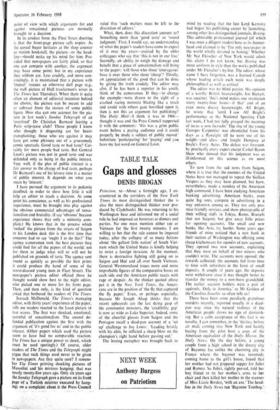Gaps and glosses
TABLE TALK DENIS BROGAN
Princeton, NJ—About a fortnight ago, I en- countered in the corridors of the New York Times its most distinguished thinker (he is also the most distinguished thinker ever pro- duced by Clydebank). He was returning to his Washington base and informed me of a social rule he had imposed on hostesses at dinners and parties. No one must mention either LBJ or Vietnam for the first twenty minutes. I am willing to bet that the rule cannot be imposed today, after the collapse of so many fictions about 'the gallant little nation' of South Viet- nam which the United States is kindly helping to resist a foreign invasion. At the moment, there is destructive fighting still going on in Saigon and Hue and all over South Vietnam. General Westmoreland issues more and more improbable figures of the comparative losses on each side and the American public reacts with rage or despair. As the thinker quoted above put it in the New York Times, the Ameri- cans are in the position of 'the fly that captured the fly paper.' Even, or perhaps especially, because Mr Joseph Alsop thinks that the recent upheavals are the last dying gasp of the communist monsters, the 'credibility gap' is now as wide as Lake Superior. Indeed, some of the cheerful glosses from Saigon and the Pentagon recall a dead-pan account of a 'set up' challenge to Joe Louis: 'Leading briskly with his chin, he inflicted a sharp blow on the champion's right hand before passing out.'
The boxing metaphor was brought back to
mind by reading that the late Lord Kemsley had begun his publishing career by launching. among other less distinguished journals, Boxing. This admirable professional journal (of which I was once a diligent reader) bore as its banner- head and claimed to be 'The only newspaper in the world wholly devoted to boxing.' Whether Mr Nat Fleischer of New York would admit this claim I do not know, but Boxing was more uniform in style than the works published under Mr Fleischer's by-line. The editor, whose name I have forgotten, was a learned Cantab whose leading article each week was deeply philosophical as well as critical The editor was no blind patriot. His opinion of a worthy British heavyweight, Joe Beckett, was succinct. 'Joe's mind makes one revolution every twenty-four hours—if that' and of an even more dreary heavyweight, All Bright, he wrote that 'until I saw Alf Bright's performance at the National Sporting Club last week, I had not fully grasped the meaning of hulls a non lucendo.' The rise of the young Georges -Carpentier was chronicled from his days as a flyweight till he went out of his weight—and class—and fought Dempsey at Boyle's Forty Acres. The defeat was foreseen. by practically every expert except Cashel Byron Shaw who showed that his judgment was as ill-informed on this science as on most others.
To turn from the sad news from Saigon, where it is true that the enemies of the United States have not managed to repeat the Sicilian Vespers as they may have planned, but have,. nevertheless, made a monkey of the American high command, I have been studying American banking advertising. American banks, even quite big ones, compete in advertising in a way unknown among us. They not only pro- mise friendly services, and show photographs of their willing staffs in Tokyo, Rome, Brussels (but not Saigon), but give away little prizes for opening accounts. The small and new banks, like Avis, try harder. Some years ago, friends of mine noticed that a new bank in their section of Washington was offering some cheap kitchenware for openers of new accounts. They opened two new accounts, explaining that they were on behalf of two minors who couldn't write. The accounts were opened; the rewards collected; the accounts fed from time to time with refreshers in the form of small deposits. A couple of years ago, the deposits were withdrawn since it was thought better to transfer the money to a new-born grandchild. The earlier account holders were a pair of squirrels. 'Only in America,' as Mr Golden of the Carolina Israelite so often tells us!
There have been some peculiarly gratuitous murders recently, reported usually in a dead- pan way since the natural violence of the American people shows no sign of diminish- ing. But a calm acceptance of this fact is no novelty. I can remember, in the 'thirties, before air mail, coming into New York and hastily buying from the pilot boat a copy of the American equivalent of the Daily Mirror, the Daily News. On the day before, a young couple from a high school in the dreary city of Bayonne (so unlike the charming city in France where the bayonet was invented), coming home to the girl's house, found that her mother had not prepared supper for Juliet and Romeo. So Juliet, rightly peeved, told her boy friend to tie her mother's arms to her chair and then killed her mother in the manner of Miss Lizzie Borden, 'with an axe.' The head- line in the Daily News ran 'Bayonne Tomboy.'


































 Previous page
Previous page